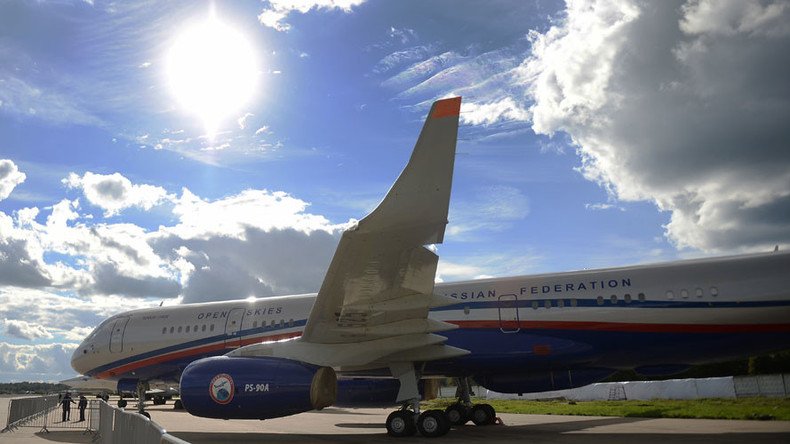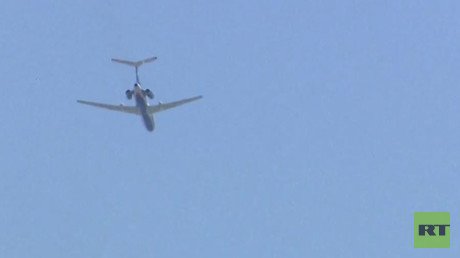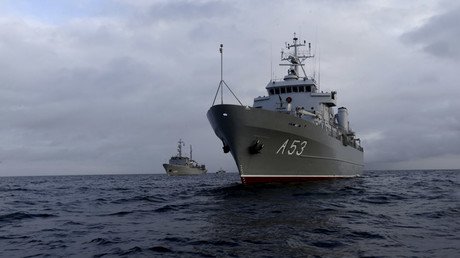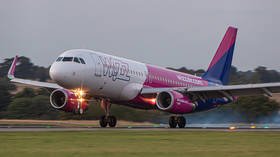‘Stick to the deal,’ says Kremlin as US poised to curb Russian control flights over its soil

The US may scrap a transparency deal with Russia, believing that Moscow is not in compliance with its terms, General Dunford said. Moscow suggested that the Open Skies treaty must be strictly observed by all members.
On Tuesday, the US could announce that it will curb Russian observation flights over American territory under the treaty, the Wall Street Journal reported earlier. The announcement is expected during the meeting of the Open Skies consultative commission in Vienna, the newspaper said. Russian officials said they were aware of the imminent restrictions.
According to the WSJ, the US military see a diminishing value of the treaty, which was negotiated in the early 1990s and came into force in 2002, due to advances of satellite imaging technology.
The treaty allows member states to schedule observation flights over each other’s territory to monitor military deployments and is part of a crumbling framework for building trust between Russia and NATO members.
Commenting on the expected announcement, Kremlin spokesman Dmitry Peskov said treaty members “should strictly follow its terms and raise any complaints through mechanisms of the treaty.”
America’s position on the treaty was clarified on Tuesday by Chairman of the Joint Chiefs of Staff Joseph Dunford, who said the US would like to preserve Open Skies but was prepared to scrap it, “if Russia is not in compliance.”
The American delegation is expected to accuse Russia of breaching the treaty, the newspaper reported earlier citing a senior US State Department official. It is to cite restrictions imposed by Russia on Open Skies flights over its territory over the past few years and announce “reciprocal countermeasures,” which main include limitation of Russian flights over Alaska and Hawaii.
In particular the US is irritated by restrictions imposed on observation flights over the Kaliningrad Region, the report said. The restrictions force two flights to be taken instead of just one to cover the entire territory of the Russian exclave in the Baltics.
“There have been reports about all kinds of sophisticated radar systems – air defense, area denial capabilities – designed to keep NATO warships and airships away,” Michael Carpenter, a former Deputy Assistant Secretary of Defense with responsibility for Russia, Ukraine, and Eurasia, told the newspaper. “If they have that sort of weaponry, we would like to have more transparency about what is there.”
Aleksandr Peresypkin, a retired Russian Major General and member of the Russian delegation in Vienna, told the WSJ that the US itself was “resourceful in reducing access to its airspace.”
“We have serious claims that a number of participating states are interfering with observation flights,” he said. “Our partners, in an attempt to ‘balance’ mutual claims, often just come up with small problems, elevated to the rank of big ones.”
The Open Skies treaty currently has 34 members, most of them European nations, but also including the US, Canada, Ukraine, Georgia, Russia and Belarus. Footage shot form observation planes during flight is shared among member states, but NATO members agreed not to inspect each other, which, the Russian Foreign Ministry remarks, “creates a certain misbalance of information and… violates the spirit of the treaty.”
Ukraine and its allies over the past few years scheduled some two dozen Open Skies flights over Russia along the two countries mutual border. The flights were meant to prove Kiev’s allegations that Russia had deployed large forces along the border and was providing military hardware to separatist entities in eastern Ukraine. The flight failed to provide such evidence.
The treaty last came into public attention in August after a Russian observation plane flew over the White House, the Pentagon, the CIA HQ and a military base in Maryland. Coming amid a period of high tension in US over alleged Russian interference with the 2016 presidential election, the flight sparked media frenzy in America.















